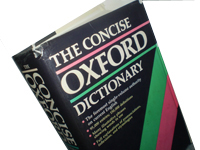Proof-reading

Commercial printers used to employ professional proof-readers. They generally don't anymore.
A good proof-reader is a solitary being with pedantic qualities. A good proof-reader will put themselves in the position of your reader. They won't simply check the spelling and layout of your copy. They will have a fanatical devotion to consistency, to checking facts and to asking the simple question 'does this make any sense?'.
I once published the fact that the institution I work for had a Professor of Pubic Administration. This taught me three valuable lessons:
- NEVER rely on built-in spell checkers.
- NEVER proof-read your own work.
- NEVER rely on built-in spell checkers.
Good proof-readers will spot things that the untrained eye won't. They know the difference between hyphens, en and em rules and when to use them.
Proof-reading should be done in an environment free of distractions. All you need to have to hand is a supply of coffee and a small library of reference works. I use the Oxford set - Concise English Dictionary, Dictionary for Writers and Editors and Thesaurus. I also have Hart's Rules (for compositors), the Chicago Style Guide and Sir Ernest Gower's Plain English kicking about somewhere.
So if you need your Meisterwerk proof-read properly, I'm your man.
|